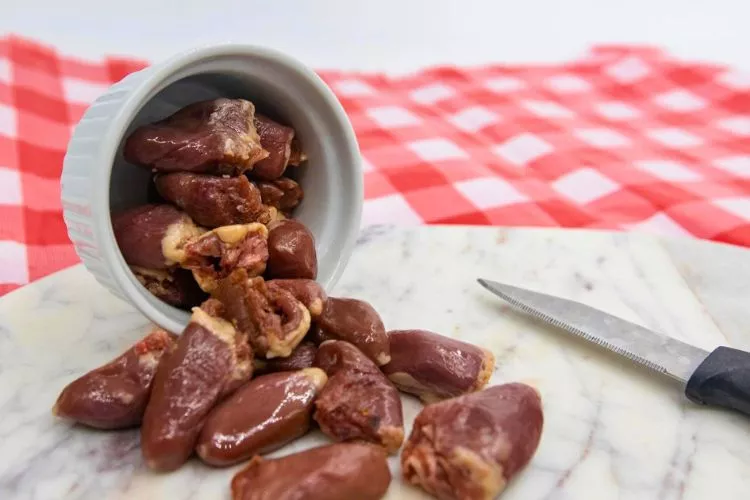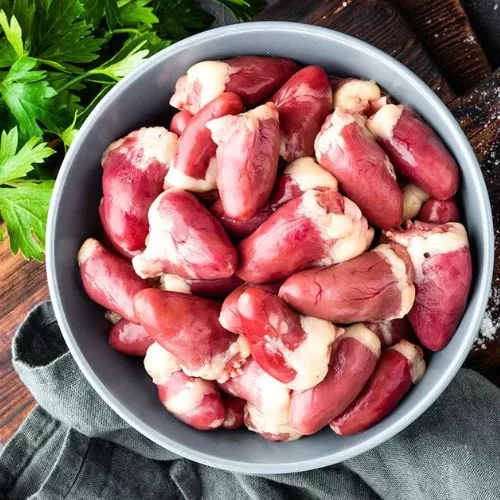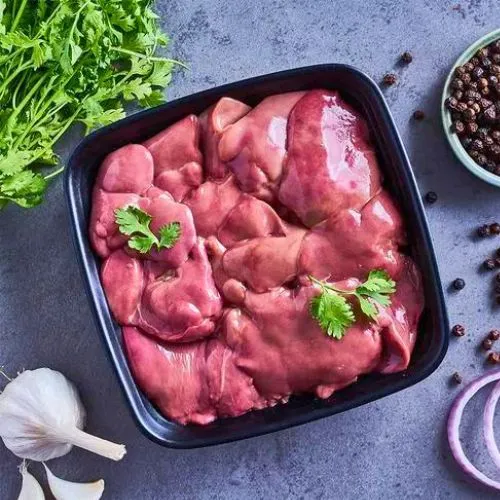Many dog owners often wonder if venturing away from commercial pet food can offer improved nutrition for their furry companions. Among the myriad of options is a common product of our own food prep – chicken hearts. Can dogs eat chicken hearts?
There are many factors to consider, from nutritional benefits to potential risks, and total impact on your pet’s health.
This article aims to clarify whether chicken hearts are a suitable extra treat or meal addition for our canine friends. Let’s explore the ‘heart’ of the matter.

🐾 Can dogs eat chicken hearts?
Yes, dogs can eat chicken hearts. Not only can they consume them, but chicken hearts can be a valuable part of their diet. These organ meats are packed with protein, essential amino acids, and rich in vitamins such as B12 and A, along with minerals including zinc, iron, and selenium.
These nutrients contribute to overall health, helping to maintain energy levels, promote shiny coats, and support a robust immune system. Despite these benefits, chicken hearts should be fed in moderation, forming only a small proportion (usually less than 10%) of your dog’s overall diet, as excessive organ meat can lead to vitamin toxicity.
Always introduce new foods to your dog gradually, observing for any adverse reactions. Though rare, some dogs may have allergies or digestive sensitivities towards chicken hearts. Always consult a veterinarian before making major changes to your pet’s diet.
🐾 Can dogs eat chicken hearts raw?
Yes, dogs can eat chicken hearts raw. Supporters of a raw diet for dogs advocate that it’s more natural and healthy, mimicking what canines would consume in the wild. Chicken hearts, high in protein and rich in important vitamins and minerals are often included in such diets.
However, it’s important to purchase them from a reliable source to minimize risks of contamination with bacteria or parasites that can upset your dog’s digestive system or even cause serious illness.

It’s also crucial to ensure they are handled and stored properly. While some experts endorse raw diets, others argue that the risks outweigh the benefits.
Before switching your dog to a raw diet or introducing raw chicken hearts, it’s recommended that you consult with your vet or a pet nutrition expert to understand the potential implications for your dog’s health.
🐾 Can dogs eat chicken hearts everyday?
While dogs can eat chicken hearts, it is not advisable for them to consume them every day. Chicken hearts should be fed in moderation and as a supplement or treat, not as the main staple of their diet.
As organ meats, chicken hearts are rich in nutrients – including vitamins, minerals, and essential amino acids – but they should only comprise a small portion (typically less than 10%) of a dog’s total diet. Consuming an excessive amount of organ meats can lead to vitamin toxicity, particularly of vitamins A and D.
It is crucial to maintain a balanced and well-rounded diet to support your dog’s overall health, including essential nutrients, carbohydrates, and both muscle and organ meats.
Always consult a veterinarian or pet nutritionist before making significant changes to your dog’s diet and to determine the appropriate frequency of feeding chicken hearts, as factors such as breed, age, and size may also come into play.
🐾 How many chicken hearts can a dog eat a day?
The number of chicken hearts a dog can eat a day depends on their size, weight, and overall health. Generally, most experts recommend giving your dog one chicken heart per day for every 20 pounds of body weight.

However, chicken hearts should not make up more than 10% of your dog’s daily caloric intake. For example, if your dog requires 500 calories per day, they should not consume more than 50 calories of chicken hearts.
Keep in mind that this is only a suggested amount; individual circumstances may vary. It is always best to consult a veterinarian or pet nutritionist for personalized advice before making significant changes to your dog’s diet.
🐾 How to cook chicken heart for dogs?
Cooking chicken hearts for dogs is a simple process that doesn’t require many ingredients or large amounts of time. Here’s a detailed guide:
Ingredients
- Chicken hearts
- Water
Optional:
- Vegetables good for dogs (peas, carrots, or pumpkin, for example)
- Dog-approved herbs for added flavor (but avoid onions, garlic, and spices that may upset your dog’s stomach)
Instructions
- Purchase the Chicken Hearts: Buy chicken hearts from a reputable store or butcher to ensure their quality and freshness.
- Clean the Chicken Hearts: Rinse the chicken hearts under cool water. Ensure they are thoroughly cleaned to renew the surface and remove any bacteria.
- Trim the Fat (if necessary): While small amounts of fat are okay, and can even seem delicious to dogs, chicken hearts are already high in cholesterol and you might want to trim excess fat to avoid any potential issues.
- Boil the Chicken Hearts: Place the chicken hearts in a pot and cover them with water. Bring the water to a boil, then reduce to a simmer. Boiling is a safe and healthy way to cook for dogs because it doesn’t require any oils or seasonings, and it thoroughly cooks the meat.
- Simmer for 20 Minutes: Let the chicken hearts simmer for about 20 minutes to ensure they are fully cooked.
- Check for Doneness: To make sure the chicken hearts are cooked through, cut into one heart. It should no longer be pink inside.
- Cook Vegetables (Optional): If you’d like to add more nutrition, you can boil approved vegetables alongside the chicken hearts. Just make sure to cut them into bite-sized pieces appropriate for your dog.
- Cool Down: Once fully cooked, strain the hearts (and veggies) from the water and let them cool down completely before feeding them to your dog.
- Serve: Feed these cooked hearts to your dog on their own, or mix them in with their regular food. Remember, treats and extras should form only a small part of your dog’s diet.
Notes
Always introduce new foods like chicken hearts slowly and in small amounts. Keep a close eye on your dog to ensure they don’t have a negative reaction. Consult with your veterinarian before making any significant changes to your dog’s diet.
🐾 How long to cook chicken hearts for dogs?
Chicken hearts should be cooked for approximately 15-20 minutes. Make sure that they reach an internal temperature of at least 165°F (74°C) to ensure they’re fully cooked and safe for your dog to eat.

Remember, when serving chicken hearts, you should cut them into smaller pieces to avoid choking, especially in smaller dogs. Chicken hearts can be a beneficial part of a balanced, species-appropriate diet but should not make up more than 5% of the dog’s daily dietary intake.
You may also like to know: Can Dogs Eat Tostitos? | Can Dogs Eat Pringles? | Can Dogs Eat Crab Sticks?
🐾 frequently asked questions (FAQs)
Answer: Both chicken and beef hearts are beneficial for dogs. Chicken hearts are smaller and softer, making them more suitable for smaller dogs or as occasional treats. Beef hearts are larger and perfect for larger breeds or as a more substantial meal. Both offer essential nutrients like protein, vitamins, and minerals. However, beef hearts are slightly more nutrient-dense, with higher concentrations of vitamins and minerals. It comes down to personal preference and your dog’s size and nutritional needs.
Answer: Yes, freeze-dried chicken hearts are good for dogs. The freeze-drying process preserves the nutritional value of the hearts, making them a nutrient-rich treat. They are lightweight, easy to store, and have a longer shelf life compared to fresh or cooked hearts. Freeze-dried chicken hearts maintain the essential proteins, vitamins, and minerals that benefit your dog’s health. Ensure you purchase high-quality freeze-dried hearts from a reputable supplier to ensure they are safe and appropriate for your dog.
Answer: First, rinse the chicken hearts in cold water. Cook them by boiling for 15-20 minutes until they reach an internal temperature of 165°F (74°C). Chop them into smaller, manageable pieces to prevent choking hazards, especially for smaller dogs. Chicken hearts should make up no more than 5% of your dog’s daily dietary intake. You can mix the cooked hearts with their regular food or feed them as occasional treats. Always observe your dog for any adverse reactions when feeding them new types of food.
Answer: The best animal heart for dogs depends on factors like size, nutritional needs, and preference. Chicken, beef, and lamb hearts are all suitable options, providing essential nutrients like protein, vitamins, and minerals. Beef hearts are more nutrient-dense compared to chicken or lamb hearts. However, chicken hearts might be a better choice for smaller dogs. When feeding animal hearts, ensure that the feeding size is appropriate for your dog, and always source high-quality, fresh hearts to ensure their safety.
Answer: The best organ meats for dogs include liver, kidney, heart, and spleen. These organs are rich in essential nutrients such as protein, vitamins A, B, and D, minerals like iron, zinc, and phosphorus. Liver, in particular, is an excellent source of vitamin A, while kidneys are high in vitamin B. Hearts are a rich source of taurine, essential for maintaining a healthy heart and eyesight. It’s crucial to feed organ meats in moderation, as overconsumption can cause health issues. A mix of these organ meats will provide a well-rounded, nutrient-dense addition to your dog’s diet.
Conclusion:
Chicken hearts are not only safe but also a nutritious addition to your dog’s diet. They are rich in vital protein, vitamins, and minerals. However, due to their high nutrient content, they should be fed in moderation, comprising no more than 5% of your dog’s daily food intake.
Whether you choose to feed your dog chicken hearts raw, cooked, or freeze-dried, ensure they are sourced from reputable providers and prepared properly to prevent health risks. Always observe your dog when introducing any new foods to detect any adverse reactions promptly.
